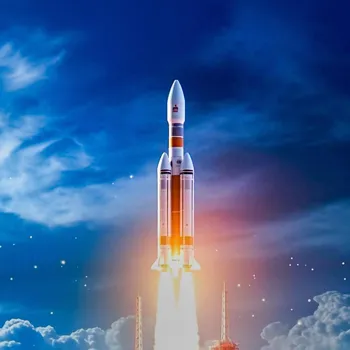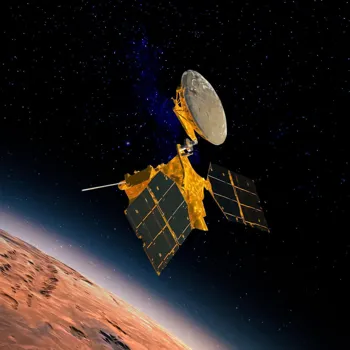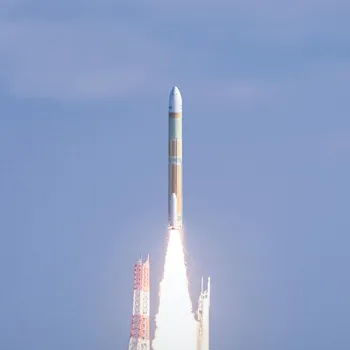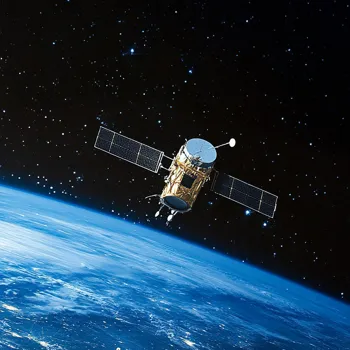Unraveling the Mysteries of Space Agencies: 8 Key Players Shaping the Future. Dive in for a cosmic journey!
Space, the final frontier! It's not just about astronauts and rockets anymore. Space agencies
worldwide are playing a crucial role in our daily lives, from weather forecasting to communication and even helping us understand climate change.

These organisations are tirelessly working to explore the cosmos, develop new technologies, and ensure a sustainable future for humanity, both on Earth and beyond. Let's take a look at eight such key players shaping the future of space exploration.
NASA leads in space exploration and innovation, shaping the future
First up is NASA, the National Aeronautics and Space Administration of the United States. Probably the most well-known space agency, NASA has been at the forefront of space exploration since it was established in 1958.

From the iconic Apollo missions that put humans on the Moon to the current Artemis program aiming to establish a lunar base, NASA has consistently pushed the boundaries of what's possible.
Beyond human spaceflight, NASA's Earth observation satellites provide critical data for understanding our planet's changing climate. They also develop cutting-edge technologies that find applications in various fields, including medicine, communication, and materials science.
NASA's commitment to innovation and exploration makes it a vital force in shaping the future of space exploration.
Their research also extends to understanding our solar system and the universe beyond, with missions like the James Webb Space Telescope providing breathtaking images and invaluable data to astronomers around the globe.
NASA’s budget is one of the largest, allowing them to undertake many ambitious projects simultaneously. This includes robotic missions to Mars searching for signs of past or present life, and developing new technologies for future deep-space explorations.
The agency also collaborates with international partners on several projects, fostering global cooperation in space exploration. Many scientists and engineers around the globe can fulfill their dreams by working in NASA.
ESA collaborates on ambitious space missions, scientific research, and satellite navigation
Next on our list is the European Space Agency, or ESA. ESA represents a collaboration of numerous European countries, pooling resources and expertise to achieve ambitious space endeavors.

ESA is known for its scientific missions that probe the fundamental laws of the universe and study the Earth's environment. One notable example of ESA's scientific achievements is the Rosetta mission, which successfully landed a probe on a comet for the first time in history.
ESA also plays a crucial role in developing satellite navigation systems like Galileo, which provide an alternative to GPS. Besides, ESA is heavily involved in Earth observation, launching satellites that monitor climate change, track deforestation, and support disaster response efforts.
The agency provides crucial support to technology and space start-ups and small businesses. ESA's strength lies in its collaborative nature, combining the diverse skills and resources of its member states to achieve common goals.
This collaborative approach enables ESA to manage a broad range of programs, from developing new launch vehicles to conducting cutting-edge research in areas like astrophysics and planetary science.
ESA has also invested significantly in developing technologies that promote sustainable space exploration, such as electric propulsion systems and methods for in-situ resource utilization.
ISRO: India's space agency excels in global space exploration
Moving eastward, we find the Indian Space Research Organisation, or ISRO. ISRO is India's national space agency and has rapidly emerged as a major player in the global space arena. Known for its cost-effective approach to space exploration, ISRO has achieved remarkable feats with limited resources.

ISRO has successfully launched numerous satellites for communication, Earth observation, and scientific research, benefiting India and other countries.
Their Chandrayaan missions to the Moon and Mangalyaan mission to Mars have garnered international acclaim, demonstrating India's growing capabilities in deep-space exploration. ISRO is also committed to developing indigenous launch capabilities, reducing India's reliance on foreign providers.
These launchers give support and jobs to indigenous manufacturing. ISRO's future plans include ambitious missions to Venus and further exploration of the Moon and Mars. Their work is really helping the nation overall!
ISRO's focus on practical applications of space technology underscores its commitment to using space for national development. This includes providing remote sensing data for agriculture, urban planning, and disaster management, as well as delivering communication services to remote areas.
JAXA: Leading Japan's Space Program & Advancing Space Science
Now let's look at the Japan Aerospace Exploration Agency, or JAXA. JAXA is responsible for Japan's space program and plays a significant role in space science, planetary exploration, and developing advanced space technologies.

JAXA has launched several successful missions to explore asteroids, including the Hayabusa missions that collected samples from asteroids and returned them to Earth. This helped the scientists around the world to learn about life beyond earth.
JAXA is also developing new technologies for future space missions, such as advanced propulsion systems and robotics, increasing efficiency and sustainability. JAXA is highly considered and regarded for it's use of the scientific method.
Not only this, JAXA is also actively involved in international collaborations, working with other space agencies on projects like the International Space Station and climate change research.
JAXA's commitment to technological innovation and scientific discovery positions it as a key player in the global space community. For example, is working on developing new generations of rockets that are safer, more reliable, and more environmentally friendly.
Roscosmos: Russia's space legacy and future endeavors
Roscosmos, the State Space Corporation of Russia, has a rich history dating back to the early days of space exploration. Roscosmos inherited the legacy of the Soviet space program, which launched the first artificial satellite, Sputnik, and sent the first human into space, Yuri Gagarin.

Roscosmos continues to play a vital role in human spaceflight, operating the Russian segment of the International Space Station and launching Soyuz spacecraft that transport astronauts to and from the ISS. They operate with high diligence and safety, ensuring that our astronauts are safe.
Roscosmos is also involved in launching satellites for communication, Earth observation, and scientific research. These satellites help the Russian people to stay connected and learn more about the world.
Roscosmos' future plans include developing new launch vehicles and exploring the Moon and other celestial bodies. Further, they're a reliable supply source for resources that are helpful to missions.
Roscosmos' long history and extensive experience in space technology make it an important partner in international space endeavors.
The Canadian Space Agency contributes significantly to space exploration
The Canadian Space Agency, or CSA, may be smaller than some of the other agencies on this list, but it makes significant contributions to space exploration. CSA focuses on niche areas where it has particular expertise, such as robotics and space medicine.

Canada made the robotic arm, Canadarm, used with the space shuttle. CSA provides data scientists with software for space navigation.
Canadian astronauts have participated in numerous space missions, conducting scientific experiments and helping to maintain and operate the International Space Station. The CSA’s technology is widely used and recognized in the field.
CSA focuses in many areas of the world, which helps bring peace and stability. Canada’s commitment to innovation and international collaboration makes it a valuable partner in global space endeavors. This dedication greatly benefits Canada, allowing them to grow and invest in all fields.
Canada's geographic location also makes it an ideal location for ground-based space infrastructure, such as satellite tracking stations.
Space agencies drive global progress through innovation, collaboration, and exploration for a better future
These space agencies help discover new technologies, explore unknown areas, and increase global collaboration. They support the improvement of life on Earth through tracking weather, satellite communications and more.

Future space exploration is something to be excited for, and they will surely lead the way to progress. Their work helps keep humanity on track and discover new things.
Through innovation and research, they give many hope for a better, more equal world, by educating people and finding solutions together. International collaboration helps to show how connected we really are!
The role of these agencies is not just about space but about progressing our humanity and taking steps forward for humankind.













